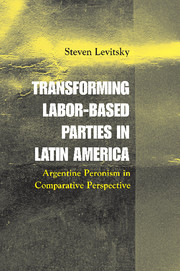Book contents
- Frontmatter
- Contents
- Figure and Tables
- Acknowledgments
- 1 Labor-Based Party Adaptation in the Neoliberal Era: Rethinking the Role of Party Organization
- 2 Origins and Evolution of a Mass Populist Party
- 3 An “Organized Disorganization”: The Peronist Party Structure in the 1990s
- 4 Populism in Crisis: Environmental Change and Party Failure, 1983–1985
- 5 From Labor Politics to Machine Politics: The Transformation of the Peronist Party–Union Linkage
- 6 Menemism and Neoliberalism: Programmatic Adaptation in the 1990s
- 7 A View from Below: Party Activists and the Transformation of Base-Level Peronism
- 8 The Paradox of Menemism: Party Adaptation and Regime Stability in the 1990s
- 9 Crisis, Party Adaptation, and Democracy: Argentina in Comparative Perspective
- References
- Index
6 - Menemism and Neoliberalism: Programmatic Adaptation in the 1990s
Published online by Cambridge University Press: 22 December 2009
- Frontmatter
- Contents
- Figure and Tables
- Acknowledgments
- 1 Labor-Based Party Adaptation in the Neoliberal Era: Rethinking the Role of Party Organization
- 2 Origins and Evolution of a Mass Populist Party
- 3 An “Organized Disorganization”: The Peronist Party Structure in the 1990s
- 4 Populism in Crisis: Environmental Change and Party Failure, 1983–1985
- 5 From Labor Politics to Machine Politics: The Transformation of the Peronist Party–Union Linkage
- 6 Menemism and Neoliberalism: Programmatic Adaptation in the 1990s
- 7 A View from Below: Party Activists and the Transformation of Base-Level Peronism
- 8 The Paradox of Menemism: Party Adaptation and Regime Stability in the 1990s
- 9 Crisis, Party Adaptation, and Democracy: Argentina in Comparative Perspective
- References
- Index
Summary
In the contemporary period, what the electoral platforms say is of no use.
– Carlos MenemBeginning in 1989, under the leadership of newly elected President Carlos Menem, the PJ underwent a stunning about-face. Despite having been elected on a populist platform, the Menem government abandoned the PJ's traditional program and embarked upon a set of neoliberal reforms that have been characterized as the most far-reaching in Latin America in the 1990s (Gwartney et al. 1996: 113; Inter-American Development Bank 1997: 96). The reform program was carried out with striking political success. Although many PJ leaders and activists were critical of the neoliberal turn, Menem confronted surprisingly little intraparty opposition.
This chapter seeks to explain the Menem leadership's capacity to sell a radical neoliberal project to the PJ. Although several factors, including the depth of the economic crisis and the skilled leadership of Menem himself, contributed to Menem's success, the chapter argues that this process was greatly facilitated by the Peronist party structure. Many party leaders and activists had serious doubts about the neoliberal strategy, but the weakly routinized nature of the PJ organization left them with few opportunities, and little incentive, to challenge Menem. The PJ's organizational structure enhanced Menem's strategic autonomy in three ways. First, in the absence of a stable bureaucracy with established career paths and secure tenure patterns, many non-Menemist party leaders bandwagoned to Menemism in an effort to preserve or advance their careers.
- Type
- Chapter
- Information
- Transforming Labor-Based Parties in Latin AmericaArgentine Peronism in Comparative Perspective, pp. 144 - 185Publisher: Cambridge University PressPrint publication year: 2003



